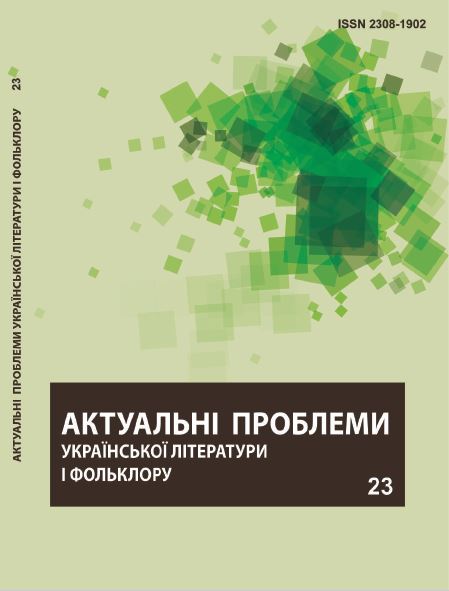Trauma as a social and cultural category: history research.
Keywords:
trauma, testimony, symptom, sinthome, psychoanalysisAbstract
“Trauma studies” studies since the 1990-th is the rapidly developing method in literature studies, it became one of the ways of nominalization, telling about events painful and closed from a transparent articulation and demonstration – both macroand microhistoric events. Concepts such as “evidence”, “post-traumatic stress disorder”, “historical trauma”, introduced by Sh. Felman and D. Laub and then tested by their followers, became the object of attention of psychologists, cultural scientists, historians, literary critics. Due to the heterogeneity of analytical optics, “trauma studies” quickly evolved into a relatively independent branch of the humanities. For post-totalitarian and post-genocidal Ukrainian society whose history evidenced a lot of historical traumas during the twentieth century, representation and perception of its experience became a serious social and scientific challenge. So putting categories of injury in modern study means nothing but an attempt to overcome the historical amnesia and attempts to restore the cultural integrity of the individual and the full national self-affirmation. Separation of the “trauma studies” as an independent branch of humanities in 1990-th was based on J. Lacan’s statement of need to return to S. Freud. Long before determining and fixing the traumatic nature of nervous disorders S. Freud distinguished mental illness, which he called “war neurosis”. This problem is sounds especially relevant now, in the context of inheritance by nations of historical memory about the catastrophes, the integration of negative elements in the psychology of the past, present and future generations. It seems to the author as self-evident that attempts to articulate and treat of post-traumatic consciousness is impossible without revisions of both macro- and microhistoric disasters, and therefore – without painful stories of trauma. Therefore, the implementation of trauma analysis, “trauma studies” as a universal key to the reading of Ukrainian literature of the twentieth century in the space of contemporary literary enables talk and interpretation of “traumatic places” in national culture and consciousness.References
Felman Sh., Laub D. Testimony: Crises of Witnessing in Literature, Psychoanalysis and History / Shoshanna Felman, Dori Laub. – New York : Taylor & Francis, 1992. – 294 p.
Caruth C. Unclaimed Experience: Trauma, Narrative and History / Cathy Caruth. – Baltimore : Johns Hopkins University Press, 1996. – 168 p.
Blight David W. The Memory Boom: Why and Why Now? // Memory in Mind and Culture, ed. by Pascal Boyer and James V. Wertsch. – New York : Cambridge UP, 2009. – Pp. 238–251.
Leys R. Trauma: A Genealogy / Ruth Leys. – Chicago: University of Chicago Press, 2000. – 312 p.
Фрейд З. Печаль и меланхолия /Зигмунд Фрейд // Основные психологические теории в психоанализе. Очерк истории психоанализа: Сборник. – Санкт-Петербург : Алетейя, 1998. – С. 211–231.
Derrida J. The Ear of the Other: Otobiography, Transference, Translation. Texts and Discussions with Jacques Derrida. – University of Nebraska Press, 1988. – 190 p.
Codde Ph. Postmemory, Afterimages, Transferred Loss: First and Third Generation Holocaust Trauma in American Literature and Film / Philippe Codde // The Holocaust, Art and Taboo: Transatlantic Exchanges on the Ethics and Aesthetics of Representation. – Heidelberg : Winter, 2010. – Pp. 61–72.
American Psychiatric Association. Diagnostic and Statistical Manual of Mental Disorders. – Fifth. – Arlington, VA: American Psychiatric Publishing, 2013. – Pp. 271–280.
Фройд З. Вступ до психоаналізу / Зиґмунд Фройд. – К. : Видавництво Соломії Павличко «Основи», 1998. – 709 с.
Lacan J. The Freudian Thing, or the Meaning of the Return to Freud in psychoanalysis // Lacan J. Ecrits: The First Complete / Jacques Lacan; transl. by A. Sheridan. – New York : W. W. Norton & Co, 1977. – Pp. 337–339.
Лакан Ж. Функция и поле речи и языка в психоанализе / Жак Лакан / Пер. с фр. А. К. Черноглазов. – М. : Гнозис, 1995. – 192 с.
Гойт Т. В. и др. Общество и коллективная травма: Семинар Питера Келлермана / Т. В. Гойт, П. П. Горностай, Е. В. Кистаева // Психодрама и современная психотерапия. – 2005. – № 2–3. – С. 141–145.
Balaev M. Trends in Literary Trauma Theory / Michelle Balaev // Mosaic (Winnipeg). – Vol. 41. – № 2. – June 2008. – Pp. 149–166.
Арендт Х. Истоки тоталитаризма / Ханна Арендт / Пер. с англ. И. В. Борисовой и др.; послесл. Ю. Н. Давидова. – М. : ЦентрКом, 1996. – 672 с.
Жижек С. О насилии / Славой Жижек / Пер. с англ. А. Смирнова и Е. Ляминой. – М. : Европа, 2010. – 182 с.
Карут К. Травма, время, история / Кэти Карут // Травма: пункты: Сборник статей / Сост. С. Ушакин и Е. Трубина. – М. : Новое литературное обозрение, 2009. – С. 561–581.
Фрейд З. Введение в психоанализ: Лекции / Зигмунд Фрейд / Ред. Е. С. Калмыкова, М. Б. Аграчева; пер. с нем. М. В. Вульф, Н. А. Алмаев. – М. : ООО Фирма СТД, 2003. – 624 с.
Lacan J. The Language of the Self: The Function of Language in Psychoanalysis: [translated with noted and commentary by Antony Wilden] / Jacques Lacan. – Baltimore : John Hopkins Press, 1981. – 235 p.

